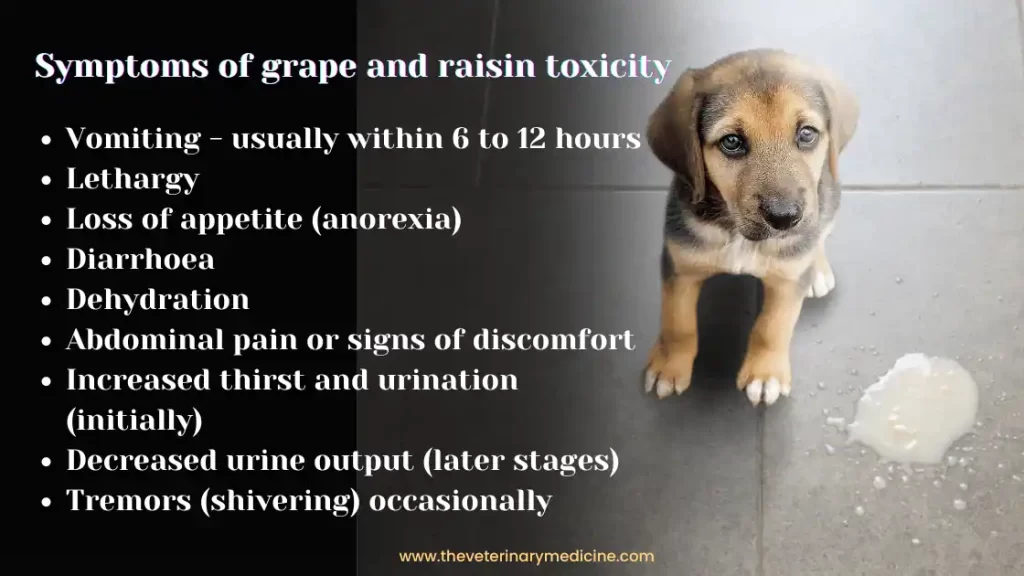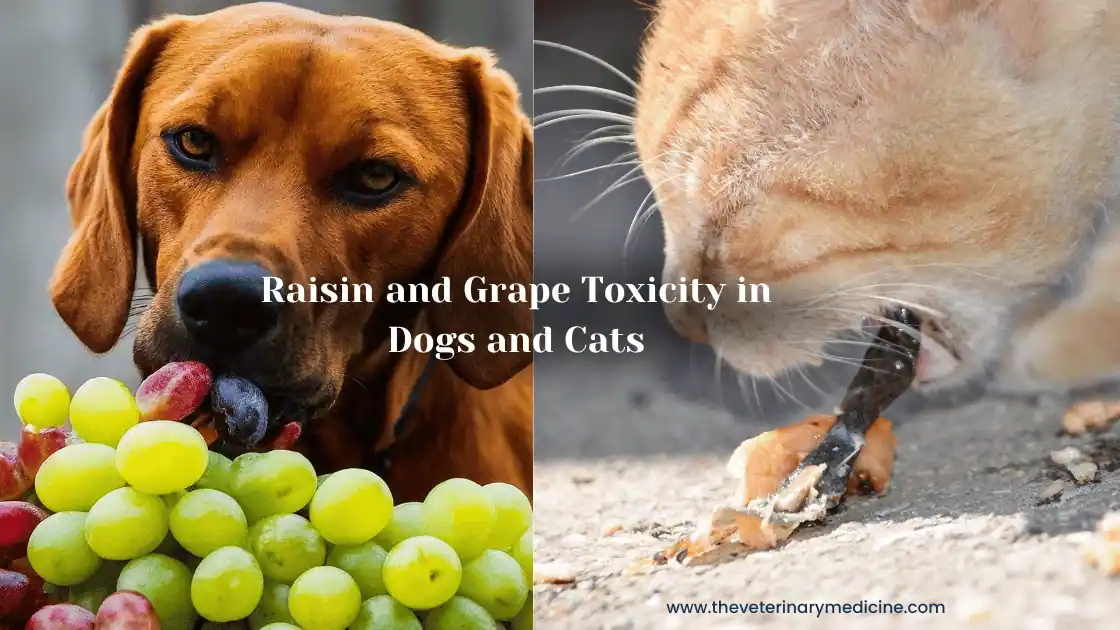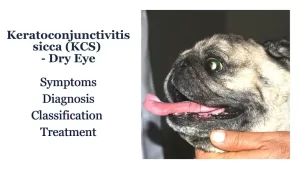Uh Oh! My Dog Ate Raisins: A Guide to Raisin and Grape Toxicosis
The exact reason behind grape and raisin toxicity remains a bit of a mystery. Theories range from fungal toxins to specific compounds within the fruits itself. Regardless of the reason, the fact remains – ingesting grapes or raisins can lead to serious health problems like kidney failure in dogs and cats.
While cats are generally less susceptible to grape and raisin toxicity than dogs, there have been anecdotal reports of feline kidney failure after ingestion. If you suspect your pet has eaten grapes or raisins, for caution; contact your veterinarian immediately. Understanding the dangers associated with raisin and grape ingestion, recognizing the symptoms of poisoning, and knowing the management strategies can be life-saving for pets.
What Makes Raisins and Grapes Toxic?
It is not known why many dogs don’t show any symptoms after ingesting grapes or raisins whereas others develop renal failure after ingestion within 72 hours. Despite extensive research, the exact toxic compound within grapes and raisins remains unidentified although raisin extracts have been shown to cause damage to canine kidney cells (primary injury occurs in the proximal renal tubular epithelium) in vitro. What is clear, however, is the severe reaction these fruits can trigger in dogs and cats, leading to acute kidney failure and, in some cases, death. It’s not clear whether the toxicity is dose-dependent, but individual sensitivity varies widely. Affected dogs develop oliguric or anuric renal failure, generally within 72 hours.
Signs and Symptoms to Watch Out For:
Not every dog who eats a grape or two will experience negative effects all of a sudden but side effects can depend on the amount and body weight of the dog or cat. However, evidence indicates that even small amounts can cause severe kidney damage in susceptible dogs and cats. So, it’s always better to discourage intake in any form.
Side effects of raisin toxicity can start appearing from 6 to 12 hours after ingestion. If you suspect your dog might have eaten some grapes, be on the lookout for these signs:
- Vomiting – usually within 6 to 12 hours (the first 24 hours)
- Lethargy
- Loss of appetite (anorexia)
- Diarrhoea
- Dehydration
- Abdominal pain or signs of discomfort
- Increased thirst and urination (initially, followed by decreased urine output in later stages)
- Tremors (shivering) occasionally
The most concerning consequence or side effect of raisin and grape ingestion in dogs is acute kidney failure. Acute toxicity has been associated with development of anuric renal failure in some dogs. This typically develops within 2-3 days after ingestion and can be life-threatening.
Clinical Findings of Raisin or Grape Toxicosis in Dogs
Serum creatinine concentrations tend to rise early and disproportionately compared with serum urea nitrogen concentrations. Oliguric or anuric kidney failure develops within 24 to 72 hours of ingestion; once anuric renal failure develops prognosis becomes grave and most of the dogs die or are euthanized. Transient increases in serum glucose, pancreatic enzymes, liver enzymes, serum calcium, or serum phosphorus concentrations can be observed in some dogs.
Diagnosis of Raisin or Grape Toxicosis in Dogs
Diagnosis of grape or raisin toxicity is based on history of exposure, clinical signs and symptoms discussed above. For differential diagnosis other causes of renal failure like ingestion of ethylene glycol, cholecalciferol should also be considered.

What to Do If Your Pet Eats Grapes or Raisins:
Don’t wait for symptoms to appear. The key to managing raisin and grape toxicosis lies in early recognition and prompt action. Time is critical in these situations. Here’s what you should do immediately:
- Immediately Contact your veterinarian or animal poison control center: They will be able to advise you on the best course of action based on the number of raisins ingested, bodyweight of pet, and any existing health conditions.
- Do not induce vomiting yourself: Unless specifically instructed by a veterinarian, avoid giving your pet hydrogen peroxide or other products to induce vomiting. These can irritate the digestive system and worsen the situation or sometimes can be life threatening.
- Gather information: If possible, try to determine how many grapes or raisins were eaten and when. This information can help in decontamination and tailoring treatment for your pet.
How to treat raisin toxicity in dogs and cats
Veterinary care is crucial. Depending on the severity of the situation, your veterinarian might recommend:
- GI Decontamination: This might involve inducing vomiting (under professional supervision) to remove the toxic substance from the stomach or administering activated charcoal to bind any remaining toxins in the digestive tract. This will be effective only in case when given within last few hours.
- Intravenous fluids: It is more important where GI symptoms has developed within 12 hours of ingestion. This helps in maintaining hydration, diuresis and supports kidney function. Aggressive intravenous fluid therapy can be given till next 48 hours depending on the condition and response to the treatment.
- Medications: Depending on the symptoms, medications to treat nausea, vomiting, or control kidney function might be prescribed. In case of oligouria urine production can be increased by administration of dopamine @ 0.5–3 mcg/kg per minute or furosemide @ 2 mg/kg by intravenous route.
- Hospitalization: In severe cases, hospitalization with intensive care/ monitoring and treatment might be necessary. Dogs with anuria are unlikely to survive. Haemodialysis or peritoneal dialysis can be attempted but prognosis remains guarded in such cases.
- Monitoring: Close monitoring of renal function is important to identify uremic crisis and progress. It should be done in all dogs and more important during fluid therapy.
When it’s too late (more than 48 hours) despite aggressive treatment, pet’s condition can deteriorate, and it may not survive.
How to prevent raisin or grape toxicity?
The best way to manage raisin and grape toxicity is to prevent it from happening in the first place. Here are some tips:
- Keep grapes and raisins out of reach: Store these fruits in sealed or closed containers or out of reach where curious dogs and noses don’t have access to them.
- Be mindful of hidden sources: Remember, grapes and raisins can be found in trail mix, baked goods, oats mix, and even some treats. Double-check ingredients before offering anything new to your pet. Grape seed extract has been used in some supplements for dogs and cats.
- Educate yourself and others: Share this information with family members, pet parents, housemates, guests and anyone who cares for their pet. Take care and pay close attention during parties or snack time where raisins are present.
Conclusion:
Grapes and raisins, these seemingly harmless treats, can actually be quite dangerous for our canine and feline friends. Raisins, grapes and zante currant (variety of raisins) toxicity have been reported in dogs and rarely in cats. Symptoms of raisin or grape toxicity includes vomiting, diarrhoea (within 6 to 12 hours), lethargy, anorexia, increased thirst (polydipsia), dehydration and increased serum creatinine and blood urea nitrogen (BUN) concentrations. In case of heavy ingestion, oliguric or anuric renal failure can happen within 24 to 48 hours. Treatment is symptomatic and usually starts with decontamination of ingested contents or induction of vomiting and administration of intravenous fluids to maintain urine output while monitoring of renal function is important.
FAQ:
Can cats / Dogs eat grapes or raisins?
No. Avoid feeding raisins in any forms. Grapes are toxic for dogs and cats.
How many raisins are toxic to dogs? Dog raisin toxicity calculator?
There is no fix amount to induce toxicity in dogs or cats. Some grape and raisin toxicity calculators suggests that 28 gms of grapes can be toxic for a dog weighing around 10 kg.
Why are raisins poisonous?
No exact reason or toxin has been identified.
What are the symptoms of raisin poisoning?
Lethargy, diarrhoea, vomiting, reduced urine output or sometimes anuric kidney failure are the common symptoms of raisin poisoning.
What to do if your dog displays symptoms of raisin poisoning?
Immediately contact poison control center or nearby veterinary care facility and start treatment before it’s too late.





